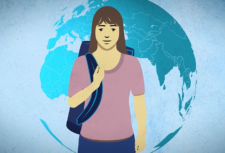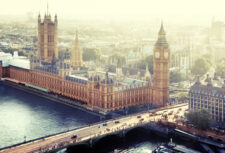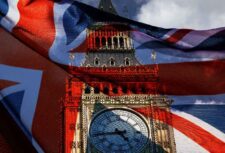Disclaimer: This article is more than 17 years old, and may not include the most up-to-date information or statistics. Please verify information with more recent sources as needed, and if you have any questions contact our Press Office.
16 February 2007
Joint Press Release: Amnesty International UK, Anti-Slavery International, Eaves, Unicef UK
As a powerful new photographic exhibition revealing the reality of trafficking in the UK opens in St Paul’s Cathedral (21 February), four leading British charities – Amnesty International, Anti-Slavery International, Eaves and Unicef UK— are calling on the UK Government to take action now to guarantee protection for all trafficked people.
Slave Britain: The twenty-first century trade in human lives, created by Panos Pictures and supported by the organisations mentioned above, runs from 21 February to 29 March in St Paul’s Cathedral. It is the first photography exhibition to reveal the extent of trafficking into the UK in all its forms. It opens at a high-profile reception on Tuesday 20 February 2007 where Secretary of State Hillary Benn MP is among the speakers.
Slave Britain is launched as the UK commemorates the bicentenary of Britain’s abolition of the slave trade. Today, thousands of men, women and children are in slavery in the UK as a result of being trafficked into a range of forced labour including domestic servitude, agricultural work and food processing, and sexual exploitation .
Traffickers use coercion, deception or the threat or use of violence to lure men, women and children into slavery. They control people through keeping their passports, demanding their labour in return for a debt or through the use of intimidation and threat.
The exhibition, produced by Panos Pictures, features photographs and cases of people trafficked, the landscapes of where they are forced to work, areas from which they are lured away by the traffickers’ promises of a better life and some of the modern-day abolitionists who work to end this abuse.
Prime Minister Tony Blair announced on 22 January 2007, that the UK would sign the Council of Europe Convention on Action Against Trafficking in Human Beings . Amnesty International, Anti-Slavery International and UNICEF UK welcome this move and urge the Government to ratify and implement the Convention to the highest standard as a matter of urgency. This will provide guaranteed minimum standards of protection for any person trafficked into the UK.
“The women, children and men who agreed to let us tell their stories in this exhibition are very brave. After being mistreated and brutalised by strangers they have trusted us to make their stories known to help try and stop others being forced or tricked into leaving their homes. We hope those who see the exhibition will be moved and will let their MPs know that protection for victims of trafficking is the very least that Britain can and should provide ,” said Kate Allen , Director of Amnesty International UK.
“This exhibition provides a unique opportunity for the public and decision makers to see what trafficking really involves, both the people affected and the fact that men, women and children are being enslaved in the UK in forced labour and forced prostitution. We hope that everyone who sees Slave Britain will seize the abolitionist spirit and join us in our call for the Government to provide the guaranteed help and support that the victims of trafficking urgently need ,” said Aidan McQuade Director of Anti-Slavery International.
“It is easy to talk about trafficking as a concept and forget the real impact it has on the individual lives of the men, women and children involved. This exhibition highlights that impact, from photographs of mothers in Lithuania who have lost daughters to traffickers, to the desperate testimonies of those forced into domestic slavery. It has been a privilege to be involved in this project, and we hope that the courage of the people who have agreed to share their stories with us will bring the reality of trafficking closer to every person who visits Slave Britain, ” said Denise Marshall Chief Executive Eaves.
“Estimates suggest that hundreds, possibly even thousands of children are trafficked into the UK every year. Child trafficking is a gross violation of the rights of a child. It is crucial that further cases are prevented and that victims of this truly abhorrent crime are identified by the authorities, rescued and given the protection and assistance they specifically need. The Government must continue to act to protect children that have been trafficked onto our shores. By signing and ratifying the Council of Europe Convention, the UK Government will guarantee minimum standards of protection for any child or adult trafficked into the UK ,” said Lord Puttnam, President of UNICEF UK .
“It is shocking that human trafficking is a reality in the UK today. Just as the churches played a key role in bringing an end to the slave trade 200 years ago, we hope this exhibition will also play a direct part in bringing to an end the demeaning and exploitative trade in human beings,” said Canon Ed Newell, director of the St Paul’s Institute, which is hosting the exhibition.
The public will be invited by Amnesty International, Anti-Slavery International and UNICEF UK to sign a petition calling on the Government to ratify and implement the Council of Europe Convention on Action Against Trafficking in Human Beings , reminiscent of the 19 th century petitions against the slave trade, which played a vital part in the abolition of Britain’s role in the Transatlantic Slave Trade.
NOTES TO EDITORS:
- Anti-Slavery International is the world’s oldest human rights organisation and campaigns for the eradication of slavery, exposing current cases, supporting local organisations to release the minimum 12.3 million people in slavery, and the implementation of international laws against slavery. For further information please contact Paul Donohoe, Anti-Slavery International’s Press Officer, on 020 7501 8934 or email p.donohoe@antislavery.org





